De Engelse dichter William Wordsworth werd geboren op 7 april 1770 in Cockermouth, Cumberland. Zie ook alle tags voor William Wordsworth op dit blog.
The world is too much with us; late and soon
The world is too much with us; late and soon,
Getting and spending, we lay waste our powers:
Little we see in Nature that is ours;
We have given our hearts away, a sordid boon!
This Sea that bares her bosom to the moon;
The winds that will be howling at all hours,
And are up-gathered now like sleeping flowers;
For this, for everything, we are out of tune,
It moves us not.–Great God! I’d rather be
A Pagan suckled in a creed outworn;
So might I, standing on this pleasant lea,
Have glimpses that would make me less forlorn;
Have sight of Proteus rising from the sea;
Or hear old Triton blow his wreathed horn.
With ships the sea was sprinkled far and nigh
With ships the sea was sprinkled far and nigh,
Like stars in heaven, and joyously it showed;
Some lying fast at anchor in the road,
Some veering up and down, one knew not why.
A goodly vessel did I then espy
Come like a giant from a haven broad;
And lustily along the bay she strode,
Her tackling rich, and of apparel high.
The ship was nought to me, nor I to her,
Yet I pursued her with a lover’s look;
This ship to all the rest did I prefer:
When will she turn, and whither? She will brook
No tarrying; where she comes the winds must stir:
On went she, and due north her journey took.
To A Butterfly
STAY near me—do not take thy flight!
A little longer stay in sight!
Much converse do I find I thee,
Historian of my infancy !
Float near me; do not yet depart!
Dead times revive in thee:
Thou bring’st, gay creature as thou art!
A solemn image to my heart,
My father’s family!
Oh! pleasant, pleasant were the days,
The time, when, in our childish plays,
My sister Emmeline and I
Together chased the butterfly!
A very hunter did I rush
Upon the prey:—with leaps and spring
I followed on from brake to bush;
But she, God love her, feared to brush
The dust from off its wings.
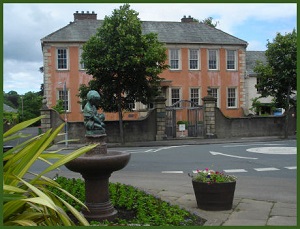
William Wordsworth (7 april 1770 – 23 april 1850)
Wordsworth House in Cockermouth
De Chileense dichteres en diplomate Gabriela Mistral werd geboren in Vicuña, Chili op 7 april 1889. Zie ook alle tags voor Gabriela Mistral op dit blog.
Death Sonnet I
From the icy niche where men placed you
I lower your body to the sunny, poor earth.
They didn’t know I too must sleep in it
and dream on the same pillow.
I place you in the sunny ground, with a
mother’s sweet care for her napping child,
and the earth will be a soft cradle
when it receives your hurt childlike body.
I scatter bits of earth and rose dust,
and in the moon’s airy and blue powder
what is left of you is a prisoner.
I leave singing my lovely revenge.
No hand will reach into the obscure depth
to argue with me over your handful of bones.
Creed
I believe in my heart that when
The wounded heart sunk within the depth of God sings
It rises from the pond alive
As if new-born.
I believe in my heart that what I wring from myself
To tinge life’s canvas
With red of pallid hue, thus cloaking it
In luminous garb.
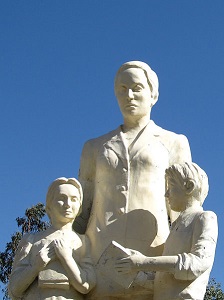
Gabriela Mistral (7 april 1889 – 10 januari 1957)
Monument in Montegrande
De Nederlandse dichter en schrijver Henk Fedder werd op 7 april 1890 te Amsterdam geboren. Zie ook alle tags voor Henk Fedder op dit blog.
Honger
Alweer gedroomd van wittebrood met ham,
De honger maakt de wildste dieren tam,
Maar Holland is door niets kapot te krijgen
‘k Wou, dat er ’n postpakket met bruine boonen kwam
Verkeersbureau
Vóór het verkeersbureau hangt een reclameplaat:
Arosa. Sneeuw. Een berg, die tot Gods hemel gaat.
En ik, in het bezet gebied gevangen,
sta platgeslagen in een nauwe straat.
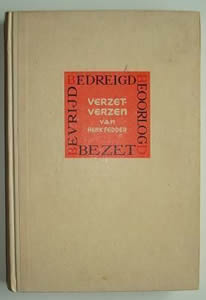
Henk Fedder (7 april 1890 – 29 mei 1979)
Cover
De Oostenrijkse schrijver Johannes Mario Simmel werd op 7 april 1924 in Wenen geboren. Zie ook alle tags voor Johannes Mario Simmel op dit blog.
Uit: Affäre Nina B.
„Er hatte viele Feinde. Ich war sein größter. Es gab viele Menschen, die ihn haßten. Niemand haßte ihn mehr als ich. Viele Menschen wünschten ihm den Tod. Ich war entschlossen, ihn herbeizuführen, den Tod des Mannes, den ich über alle Maßen haßte.
An diesem Tage war es soweit. Ich hatte lange gewartet. Nun hatte das Warten ein Ende. Ich hatte lange gezögert. Nun war es mit dem Zögern vorbei. Nun ging es um mein Leben – und um seines.
Es war schon sehr warm in Baden-Baden an diesem 7. April. Der sanfte, bewaldete Talkessel, auf dessen Grund die Stadt errichtet stand, fing die Kraft der jungen Sonne ein und hielt sie in seiner dunklen, fruchtbaren Erde fest. Viele Blumen blühten in Baden-Baden, gelbe, blaue und weiße. Ich sah Primeln und Himmelschlüssel, Krokusse und Veilchen an den Ufern der schläfrig murmelnden Oos, als ich den schweren Wagen durch die Lichtentaler Allee lenkte. Es war sein Wagen, einer von den dreien, die erbesaß, und er paßte zu ihm: ein protziger, riesenhafter Cadillac mit weißen Reifen, rot und schwarz lackiert.
Alle Menschen auf den Straßen hatten freundliche Gesichter. Die Frauen lächelten mysteriös. Sie trugen bunte, leichte Kleider. Viele trugen verwegene Hüte. Ich sah eine Menge von verwegenen Hüten an diesem Morgen, als ich zum Polizeipräsidium führ, um eine Anzeige zu erstatten. Dies schien ein Frühling der Hüte zu werden, dachte ich.
Die Männer trugen graue, hellbraune, hellblaue oder dunkelblaue Anzüge, viele hatten bereits ihre Mäntel zu Hause gelassen. Die Männer sahen die Frauen an und ließen sich. Zeit dabei. Sie hatten keine Eile. Niemand hatte an diesem Frühlingstag Eile in Baden-Baden, niemand außer mir. Mich hetzte mein Haß, mich hetzte ein unsichtbares, unhörbares Uhrwerk, das ich selbst in Gang gesetzt hatte und vor dessen Stunde Null es kein Entrinnen gab – für ihn und mich.“
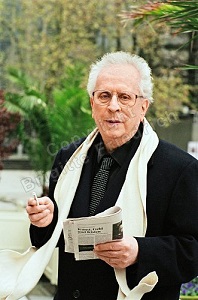
Johannes Mario Simmel (7 april 1924 – 1 januari 2009)
De Amerikaanse schrijver Donald Barthelme werd geboren op 7 april 1931 in Philadelphia. Zie ook alle tags voor Donald Barthelme op dit blog.
Uit: The Balloon
“The balloon, beginning at a point on Fourteenth Street, the exact location of which I cannot reveal, expanded northward all one night, while people were sleeping, until it reached the Park. There, I stopped it; at dawn the northernmost edges lay over the Plaza; the free-hanging motion was frivolous and gentle. But experiencing a faint irritation at stopping, even to protect the trees, and seeing no reason the balloon should be allowed to expand upward, over the parts of the city it was already covering, into the “air space” to be found there, I asked the engineers to see to it. This expansion took place throughout the morning, soft imperceptible sighing of gas through the valves. The balloon then covered forty-five blocks north-south and an irregular area east-west, as many as six crosstown blocks on either side of the Avenue in some places. This was the situation, then.
But it is wrong to speak of “situations,” implying sets of circumstances leading to some resolution, some escape of tension; there were no situations, simply the balloon hanging there — muted heavy grays and browns for the most part, contrasting with the walnut and soft yellows. A deliberate lack of finish, enhanced by skillful installation, gave the surface a rough, forgotten quality; sliding weights on the inside, carefully adjusted, anchored the great, vari-shaped mass at a number of points. Now we have had a flood of original ideas in all media, works ofsingular beauty as well as significant milestones in the history of inflation, but at that moment, there was only this balloon, concrete particular, hanging there.
There were reactions. Some people found the balloon “interesting.” As a response, this seemed inadequate to the immensity of the balloon, the suddenness of its appearance over the city; on the other hand, in the absence of hysteria or other societally-induced anxiety, it must be judged a calm, “mature” one. There was a certain amount of initial argumentation about the “meaning” of the balloon; this subsided, because we have learned not to insist on meanings, and they are rarely even looked for now, except in cases involving the simplest, safest phenomena.”
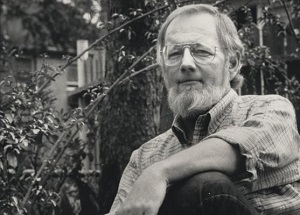
Donald Barthelme (7 april 1931 – 23 juli 1989)
De Deense dichter en schrijver Jens Peter Jacobsen werd geboren op 7 april 1847 in Thisted. Zie ook alle tags voor Jens Peter Jacobsen op dit blog.
Uit: There should have been roses (Vertaald door Anna Grabow)
„There should have been roses
Of the large, pale yellow ones.
And they should hang in abundant clusters over the garden-wall, scattering their tender leaves carelessly down into the wagon-tracks on the road: a distinguished glimmer of all the exuberant wealth of flowers within.
And they should have the delicate, fleeting fragrance of roses, which cannot be seized and is like that of unknown fruits of which the senses tell legends in their dreams.
Or should they have been red, the roses?
Perhaps.
They might be of the small, round, hardy roses, and they would have to hang down in slender twining branches with smooth leaves, red and fresh, and like a salutation or a kiss thrown to the wanderer, who is walking, tired and dusty, in the middle of the road, glad that he now is only half a mile from Rome.
Of what may he be thinking? What may be his life?
And now the houses hide him, they hide everything on that side. They hide one another and the road and the city, but on the other side there is still a distant view. There the road swings in an indolent, slow curve down toward the river, down toward the mournful bridge. And behind this lies the immense Campagna. The gray and the green of such large plains…. It is as if the weariness of many tedious miles rose out of them and settled with a heavy weight upon one, and made one feel lonely and forsaken, and filled one with desires and yearning.“
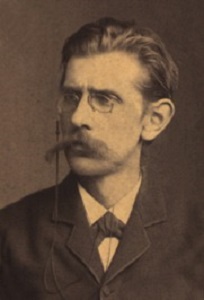
Jens Peter Jacobsen (7 april 1847 – 30 april 1885)
Zie voor nog meer schrijvers van de 7e april ook mijn blog van 7 april 2014 en ook mijn twee blogs van 7 april 2013.
